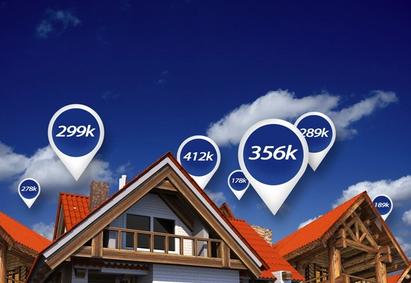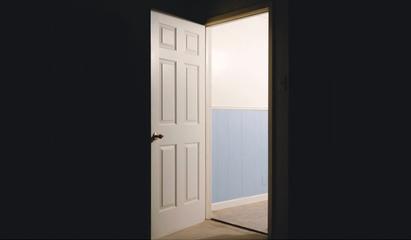Find Your Dream Home: A How-To Guide
Written by:
Andrew Tavin
Andrew Tavin
Personal Finance Writer
Andrew Tavin a contributing writer for Own Up.
See full bio
Fact Checked by:
Dan Silva
Dan is the Vice President of Marketplace Lending at Own Up. Throughout his career, he has held executive leadership positions in the mortgage and banking industry.
See full bio

Fast Links
- What Monthly Payments do you Need to Afford?
- Do you Have the Dream House Downpayment?
- How Pre-approval Can Help Make Your Dreams Come True
- Where Will Your Dream House Be?
- How to Select a Dream Neighborhood
- What Type of Property do you Want?
- What are Your Dream Features?
- Your Dream Home’s Personal Touch
- Let the Dream House Hunt Begin
Your first home may not be a perfect house. It might just be what you can afford where you need to be at the moment.
Your dream house, on the other hand, is what you aspire to. While it may not be possible to move into that home right now, it's never too early to start planning. By figuring out what you'll need to afford, where to look, and making a list of housing features you want, you'll be taking the first steps towards landing your dream home.
Americans have very different dreams! Different demographics are going to be looking for different things out of their dream home, so don’t feel the need to conform to any specific vision. Your dream home can be as personalized and unique as you are. Take the design ideas and inspiration from those luxury listings, but when it comes to an actual home search, you have to have a budget.
What Monthly Payments do you Need to Afford?
The more expensive your dream house is, the longer you'll have to wait to buy it. If it's too expensive, you may be waiting a very long time.
While it can be nice to dream of a home you can't afford right now, it's important to get a sense of what you would be able to afford at this moment. That will help you understand how much you'll need to save or how much more you'd have to earn to afford your ideal property.
The first step towards figuring out your house-buying budget is to add up all your regular, non-housing monthly expenses.
Now subtract that amount from your household's monthly take-home pay. That tells you how much you'll have available to spend on future monthly housing payments.
While these monthly housing payments may be referred to as a "mortgage payment," they will likely also include property taxes, homeowners' insurance, and private mortgage insurance (if applicable). You'll also need to factor in utility costs, repairs, and maintenance.
Do you Have the Dream House Downpayment?
The more you can pay upfront, the less you'll have to pay in interest over the course of your life in your dream house. Unless you've already fallen in love with a property you can currently afford, it might be worth taking some time to save up.
Ideally, you want enough cash available for the down payment, closing costs, and an emergency fund that could carry you through an income loss or unexpected expense for three to six months.
The dangerous pitfall of the dream home is to rationalize that you can make a smaller down payment to afford a nicer house. We strongly advise against this: with the higher principal and interest, you’ll end up paying a lot more over the life of the mortgage loan. Given that we are facing rising mortgage rates in 2023, your focus needs to be on covering as much of the principal as you can. Think of your “now” home as a prudent financial investment that can set you up for success to purchase something nicer down the line.
How Pre-approval Can Help Make Your Dreams Come True
If you want to know what sort of mortgage you could qualify for with your current financial situation you should apply for a mortgage pre-approval.
Pre-approval requires submitting financial documents like pay stubs and tax returns to a mortgage lender. If you're pre-approved for a mortgage, you'll receive a pre-approval letter outlining the kind of mortgage you'd be likely to qualify for.
That letter will not only give you a sense of what sort of home will be in your present or future price range. It also helps during the home buying process as it will show sellers that you're a serious potential buyer.
Now that you have a sense of your price range and ability to qualify for a mortgage, it's time for the fun part: deciding what you want from your perfect property.
Where Will Your Dream House Be?
One reason it might make sense to wait for your dream house is that it often takes time to figure out where you're going to settle down.
But that doesn't mean you can't start planning now.
It can even be helpful to try living in different kinds of places if you have the opportunity while you're still renting or looking for a starter home. You might find yourself more drawn towards rural or urban areas, but you can't be sure what you'll like until you give it a try. Remember that your needs and priorities will change over the course of your life: a party-centric neighborhood may become less important to you than green spaces or a good school district.
How to Select a Dream Neighborhood
When considering different neighborhoods, there are factors that are more objective and factors that are more subjective.
The more objective factors might include safety, school quality, and affordability. While these aspects are not going to be equally important to everyone– schools won't matter much if you aren't planning to have kids or your kids are past school age – do your research to learn as much as you can. If you are working with a real estate agent, he or she can provide expert knowledge of the local area.
For the more subjective factors, like noise level, access to mass transit, and general vibe, you may need to connect with people who live in the area. Try to spend some time there yourself for a few days, if possible.
What Type of Property do you Want?
The style of your home is a major factor in determining what your dream home will look like. Your first home might be a more budget-friendly option, like a townhouse. And it's totally possible that your ideal property is a townhouse.
But when you're thinking about your dream home, you should take some time to research what type of property you find most appealing. Here are practical concerns that can help guide your decision.
Do you like the exercise that stairs provide? A two-story or split level may be right for you.
Not a fan of stairs? Consider a ranch instead.
Don't need too many square feet? A nice cottage could be a perfect match.
You can discuss your style preferences with a real estate agent to help better define your dream house and guide your search.
What are Your Dream Features?
Now that you have a sense of where and what type of house you're dreaming about, you can look at the differences between individual homes. Your family's needs and preferences will help determine which features you'll want to emphasize.
Depending on the current or future size of your family, the number of bedrooms will be vital. If you like to wake up to natural light, you'll want to make sure those bedrooms are properly placed and equipped with sizable windows.
If you have a dog or like to entertain in the summer, you may want your dream home to come with a nice piece of land out back.
Whether you want a swimming pool, pool table, finished basement, or an office to finish your novel, you should make a list of the "musts," "maybes," and "nice-to-haves" you want for your dream home.
Your Dream Home’s Personal Touch
Imagine for a moment that you found your dream home. It's in the perfect neighborhood with the perfect style and features. The only problem? It's a bit rundown.
There are pros and cons to falling in love with a home in less-than-ideal condition.
You could probably guess the negative aspects. There may be a delay before you can move in, and you might have to spend a lot of money to hire people to fix your fixer-upper.
On the other hand, you can likely negotiate a lower purchase price or even require the seller to fix issues noticed during the home inspection. If you have a taste for DIY projects, you might even enjoy the challenge of working on your dream home. Be sure to do your research, however, to be certain you're not attempting a risky project better left to a professional.
If your dream home is older, there might be issues in the near future, even if everything looks fine for now. Older homes are notorious for needing constant maintenance.
If you're worried about that upkeep, you may want to focus on more recently built properties.
Let the Dream House Hunt Begin
Now that you've created your wish list and have a sense of your budget, you'll have a greater focus while surfing real estate sites or checking real estate listings in the newspaper.
Deciding what you want in your perfect home will also help you communicate your needs to an agent. The more you can figure out beforehand, the further ahead you'll be when you start your real estate search.
Have other questions about the real estate market? Our comprehensive list of the questions you should be asking will make the search for your dream home even smoother!


